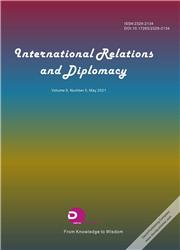The Origins of the War on Terrorism Paradigm
引用次数: 0
Abstract
It is now widely accepted among scholars that a new national security paradigm emerged in the United States after 9/11. Th parad gm h ft acc mpa ed the Ge rge W. Bu h adm trat ’ dec arat f a “g ba war terr r” and consisted of new interpretations of domestic and international law, new recognition of the threats posed by non-state actors, and a stated determination to eradicate threats everywhere before they emerged. Yet most ch ar h p ha eg ected exam at f th parad gm’ r g . t became d m a t after 9/11, but t d d t originate then. Examination of these origins and the original context shows that the war on terrorism paradigm was t created re p e t a cata tr ph c attack the Amer ca “h me a d”; rather t ar e ut f a x et e ab ut U.S. capacity exert its will in the Third World. Its foundations were established long before its post-9/11 revival. This paper places these origins within the context of U.S.-Middle East relations in the 1980s. It reads together the public discourses of Lebanese Hizbullah and of U.S. Secretary of State George P. Shultz who, more than any other U.S. official, promulgated the justifications for the war on terrorism, to show that the notion of a jihad aimed at American power and of a war on terrorism had a basis in anxieties about the capacity of American power in the M dd e Ea t. The art c e u e the auth r’ r g a tra at f the H zbu ah’ 1985 “Ope Letter t the Oppre ed” a g de Ge rge Shu tz’ pub c pr u ceme t betwee the tart f the U.S. terve t Lebanon in 1982 and the climax of the Iran-Contra scandal. It argues that provocations of the war on terrorism and the war on terrorism itself emerged out of emotions connected to the efficacy of American power in the Middle East.反恐战争范式的起源
现在,学者们普遍认为,9/11之后,美国出现了一种新的国家安全范式。这是一个由对国内法和国际法的新解释、对非国家行为者构成的威胁的新认识,以及在威胁出现之前消除所有威胁的明确决心组成的“g ba war terr r”。然而,大多数考生都参加了通用汽车考试。9·11事件后t变为d m a t,但t d d t起源于9·11之后。对这些起源和原始背景的研究表明,反恐战争的范式是在对美国的袭击中创造的;而不是美国在第三世界的能力。它的基础早在9/11后的复兴之前就建立起来了。本文将这些起源置于20世纪80年代美国与中东关系的背景下。它汇集了黎巴嫩真主党和美国国务卿乔治·P·舒尔茨的公开言论,舒尔茨比任何其他美国官员都更为公开地阐述了反恐战争的理由,以表明针对美国力量的圣战和反恐战争的概念是基于对美国力量在中东的能力的担忧。在1982年美国对黎巴嫩的入侵和伊朗门丑闻的高潮之间,1985年真主党的“Ope Letter t The Oppre ed”酒吧举办了一场艺术活动。它认为,反恐战争和反恐战争本身的挑衅是出于与美国在中东的力量效力有关的情绪。
本文章由计算机程序翻译,如有差异,请以英文原文为准。
求助全文
约1分钟内获得全文
求助全文

 求助内容:
求助内容: 应助结果提醒方式:
应助结果提醒方式:


